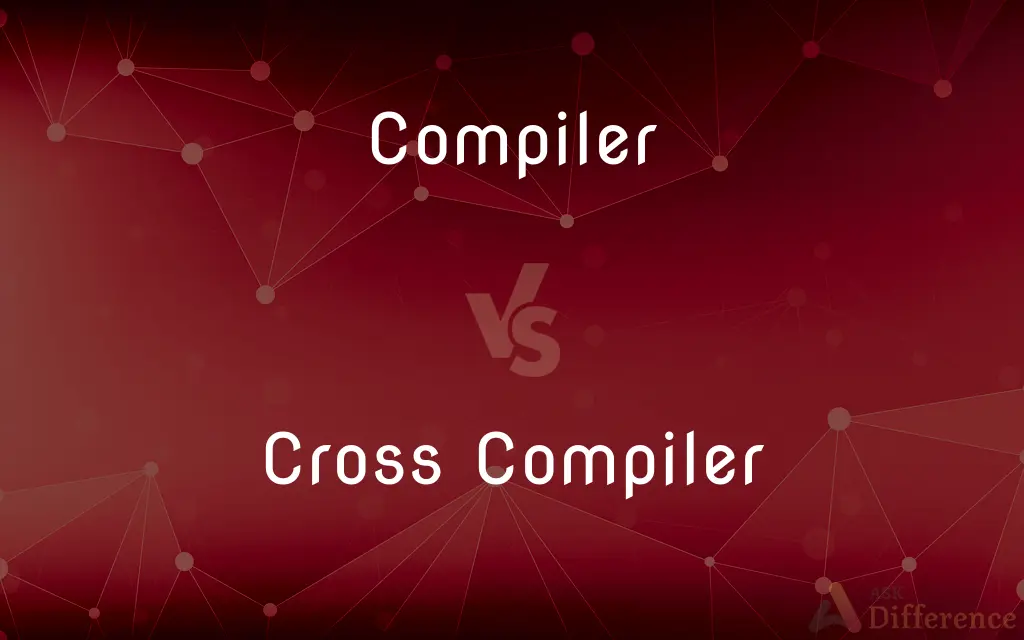Compiler vs. Cross Compiler — What's the Difference?
By Tayyaba Rehman — Published on November 5, 2023
Compiler translates code into machine language for the same platform, while Cross Compiler does so for a different, targeted platform.

Difference Between Compiler and Cross Compiler
Table of Contents
ADVERTISEMENT
Key Differences
Compiler and Cross Compiler, while rooted in the same foundational purpose of translating high-level programming language into machine code, embody distinctive operational realms. Compiler diligently curates the translation of source code written in a high-level programming language into machine code, impeccably for the same platform or operating system upon which it operates. In juxtaposition, Cross Compiler also orchestrates the translation of code, but with its gaze firmly fixed on a disparate, target platform, crafting machine code for an operating system or architecture divergent from its own operation environment.
Immersing deeper, Compiler inherently ensures that a program, once brewed with logic and functionality in a high-level language, melds seamlessly into the computational syntax of the machine, thereby enabling its execution in the operating system it was compiled on. Contrarily, Cross Compiler navigates through the complexity of ensuring the translated machine code is tailored, not for its native operational ambiance, but for an entirely distinct hardware architecture or operating system, enabling the creation of software for varied platforms from a singular development environment.
Compiler, in its translation endeavor, preserves the integrity and functionality of the source code, molding it into a language that the machine comprehends, hence forging a bridge between human-friendly syntax and machine-readable instructions, all within a homogenous environment. Cross Compiler, whilst also safeguarding functionality and logic, extends its functionality to a heterogeneous environment, ensuring the software can leap across varied architectures and operating systems, fostering a bridge between different computational environments and architectural landscapes.
As technology has burgeoned, Compiler has maintained its significance as an essential tool for software development, enabling developers to create software by writing code in a human-understandable language, and then compiling it for immediate testing and use on the same system. On the flip side, Cross Compiler has emerged as a pivotal instrument for developers aiming to create software for platforms different from their development environment, ensuring software can be crafted for diverse systems without the need for multiple development setups.
While both Compiler and Cross Compiler serve to metamorphose human-friendly code into machine language, they each carve their own niche in the software development world, with the former catering to localized development and the latter to diversified, platform-independent development. The Compiler stands as a steadfast ally for developers in testing and iterating their code in the local environment, whereas Cross Compiler equips developers with the capability to produce software for an array of platforms from a single development station, thereby amplifying developmental efficiency and reach.
ADVERTISEMENT
Comparison Chart
Target Platform
Same as development platform
Different from development platform
Development Environment Usage
Localized testing and deployment
Create software for various platforms from one environment
Architectural Compatibility
Compatible with its own architecture
Must be compatible with a different, target architecture
Usage Scenario
When developing for use on the same system
When developing for a different system/platform
Development Efficiency
Limited to its own platform
Enables development for multiple platforms
Compare with Definitions
Compiler
Code Translator
The Compiler converted our Python code into machine language for immediate testing.
Cross Compiler
Multi-Platform Development Enabler
The Cross Compiler allowed us to create our app for different operating systems from our Mac.
Compiler
Local Testing Tool
Using a Compiler, we were able to test our software on the same system it was developed.
Cross Compiler
Foreign System Code Adaptor
With a Cross Compiler, we crafted code on a PC that was executable on an embedded system.
Compiler
Development Enabler
We utilized a Compiler to iterate through different code versions on our local system.
Cross Compiler
Platform-Independent Code Translator
The Cross Compiler enabled us to develop Windows software on our Linux system.
Compiler
Single-Platform Operator
Our Compiler created machine code specifically tailored for our development platform.
Cross Compiler
Unified Development Facilitator
Our Cross Compiler allowed us to develop software for varied platforms without altering our development setup.
Compiler
Executable Producer
The Compiler translated our code into an executable file for our operating system.
Cross Compiler
Diverse Architecture Navigator
We used a Cross Compiler to ensure our software could run on ARM architecture.
Compiler
One that compiles
A compiler of anthologies.
Compiler
(Computers) A program that translates another program written in a high-level language into machine language so that it can be executed.
Compiler
One who compiles.
A compiler of poetry anthologies
My favourite crossword compiler
Compiler
(compilation) A computer program which transforms source code into object code.
Compiler
One who compiles; esp., one who makes books by compilation.
Compiler
A computer program that decodes instructions written in a higher-level computer language to produce an assembly-language program or an executable program in machine language.
Compiler
A person who compiles (or writes for) encyclopedias
Compiler
(computer science) a program that decodes instructions written in a higher order language and produces an assembly language program
Common Curiosities
What primary function does a Compiler serve?
A Compiler translates high-level programming language into machine code for the same platform it operates on.
How does a Cross Compiler differ in its operational environment?
A Cross Compiler translates code into machine language for a different, targeted platform or architecture.
Can a Compiler create software for different operating systems?
Typically, a Compiler creates software for the same operating system it runs on.
Why would a developer choose to use a Cross Compiler?
A developer might use a Cross Compiler to create software for different platforms without changing their development environment.
How does a Compiler impact software development?
A Compiler enables developers to translate, test, and iterate software on the same platform it’s developed on.
Is a Compiler capable of translating code for various architectures?
No, a Compiler typically translates code for its own architecture.
What challenges might arise when using a Cross Compiler?
Issues might include ensuring compatibility, managing different system libraries, and handling varied architecture specifications.
Is a Compiler necessary for executing high-level programming language?
While not for execution, a Compiler is vital for translating high-level code into machine-executable format.
Can a Cross Compiler develop software for multiple platforms simultaneously?
Yes, a Cross Compiler can produce code for different platforms from a single development environment.
Is a Cross Compiler utilized for every type of platform variation?
Not always; Cross Compilers are used when developing software for a platform different from the development environment.
Can a Compiler be used for cross-platform software development?
Typically no, for cross-platform development, a Cross Compiler is often used.
Can a Cross Compiler be used for local software testing?
While possible, a Cross Compiler is mainly used to compile code for different, targeted platforms.
Are there specific languages that a Compiler must adhere to?
Compilers can be designed for various programming languages, each specific to the language’s syntax and semantics.
How is a Cross Compiler beneficial in IoT development?
Cross Compilers allow developers to create software for various IoT devices with different architectures from one development setup.
Are Compilers and Cross Compilers programming language-specific?
Yes, they are typically designed to work with specific programming languages and may not be interchangeable between them.
Share Your Discovery

Previous Comparison
Income Effect vs. Substitution Effect
Next Comparison
Acidophilus vs. ProbioticsAuthor Spotlight
Written by
Tayyaba RehmanTayyaba Rehman is a distinguished writer, currently serving as a primary contributor to askdifference.com. As a researcher in semantics and etymology, Tayyaba's passion for the complexity of languages and their distinctions has found a perfect home on the platform. Tayyaba delves into the intricacies of language, distinguishing between commonly confused words and phrases, thereby providing clarity for readers worldwide.













































